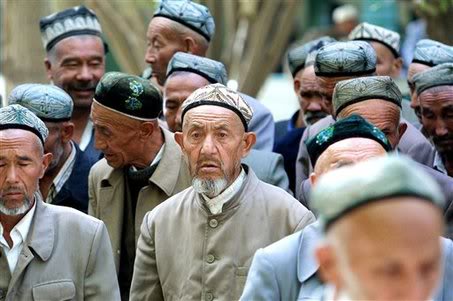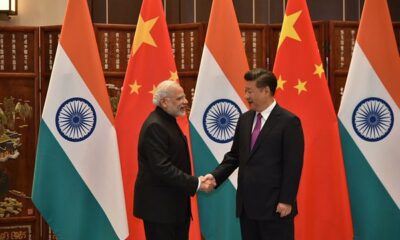Global Issues
The Little-known Persecution of Uighur Muslims in China -By Labaran Yusuf

A year after the fleeing of almost 90 percent of Rohingya Muslims – the “world’s most persecuted minority” – from Myanmar’s Rakhine state in droves into neighboring Bangladesh, following a continued state-backed campaign of violence against them or what the United Nations (UN) described as “textbook example of ethnic cleansing”. In much of the world, little is still known about yet another persecuted and discriminated minority – the Uighurs of East Turkestan.
The Uighurs are a group of mostly-Muslim, Turkic-speaking people that according to Uighur rights groups and many historians (of ancient Greek, Iranian and Chinese sources) have been living in the Central Asian region of East Turkestan as early as 300 B.C. They embraced Islam in the 9th century during the Karahanid Kingdom. The Kingdom’s capital Kashgar quickly became a major learning center of Islam. Situated on the ‘Silk Road’, or the network of trade routes that connected East and West; art, sciences, and literature flourished in the unique culture and civilization nurtured by Islamic religious institutions.

Uighur Muslims in China
The Uighurs in East Turkestan enjoyed relative independence and prosperity until the imperial Chinese Manchu Empire invaded it in the 18th century. The Manchu Empire annexed and renamed the region to “Xinjiang” (meaning ‘new territory’). During this period, Uighur power, stature, and culture went into a steep decline. In 1911, Chinese Nationalists overthrew the Manchu Empire and once again, the Uighurs suffering continues under the nationalist government.
Twice, in 1933 and 1944, the Uighurs after numerous uprisings succeeded in setting up the independent East Turkestan Republic. These were short-lived after the political and military intervention of the Soviet Union.
By 1949, Chinese Communists again defeated the Chinese Nationalists. At the same time, the situation of the Uighurs gets from bad to worse. Despite the initial promise of self-rule and even independence for non-Chinese people (i.e Uighurs and others), Beijing reneged on its promise and absorbed East Turkestan or what Communist China calls “Xinjiang” to establish the “Xinjiang Uighur Autonomous Region” in 1955.
Many observers point to the fact that the region (one-sixth of China’s land area and roughly the size of Iran), which has diverse geography, fertile lands, grand deserts, magnificent mountains, also possesses huge reserves of natural resources: gas, oil, gold, uranium, coal and other minerals – all exploited by China.
Following the launching of the “Cultural Revolution” in 1966 by China’s Communist leader Mao Zedong, the Uighur people were forced to give up their cultural and religious identities. Mosques were defaced and the Qur’an destroyed. Uighurs accused of “anti-socialist trends” by practicing their religion were disappeared, tortured and killed. Some Uighurs were detained and forced to denounce Islam. Others were subjected to compulsory unpaid labour.
Used as the site for nuclear weapons testing, the polluted land of the Uighurs has also been the site of heavy army and police concentrations, thus becoming a police state ever since.
After the collapse of the Soviet Union in the early 1990s and the emergence of independence movements throughout Central Asian countries that were once contained in the Soviet Union, the Uighurs dream of an independent republic was suppressed brutally by Beijing. The September 11 attacks on the World Trade Centre in 2001 and the subsequent launching of the so-called “War on Terror” by the West has seen China changed tune for its oppression and persecution of the 11 million Uighurs, from “anti-separatism” to “counter-terrorism”.
The Chinese Communist Party (CCP) ever since has embarked on a “crushing campaign of religious repression”, according to Human Rights Watch. From jailing people trying to make the Islamic Hajj pilgrimage to banning of the Ramadan fast and religious education for young people in Mosques; from outlawing Muslim sounding names, beards, and clothing to cancellation of public Arabic texts and classes along with silencing of the Islamic call to prayer – China is using an array of brutal measures to eradicate any culture of the Uighur Muslims in the name of “extremism”.
As Gulnaz Uighur, a London-based Uighur activist rightly notes, “China’s communist government has redefined extremism: it now refers to anyone who doesn’t eat pork, fasts during Ramadan, wears an ‘abnormal’ beard or veil, refuses to watch state TV, or abstains from alcohol and tobacco”.
Also, the CCP government’s pro-settler policies have seen the population of ethnic Han Chinese grow from six percent in 1949 to about 40 percent recently. Institutional discrimination and economic disparity are rife: with the Han Chinese migrants being given preference in terms of employment and other services over indigenous Uighurs.
Recently, a UN panel and several human rights groups such as Amnesty International and Human Rights Watch have reported the existence of “re-education” camps, which are concentration camps where up to a million Uighurs are detained and told to renounce Islam and embrace the CPP and the official ideology of the state: Atheism. Those that stubbornly defy this “indoctrination programme” are tortured and forcefully disappeared.
At the same time, mass surveillance, the broad collection of DNA samples and iris scans in order to monitor the Uighurs is commonplace in “Xinjiang”, leaving many in constant fear of arrest. More alarmingly, Uighurs face more pressure through forced “home stays” since early this year, according to Human Rights Watch. It involves government agents and officials coming to stay in Uighur homes to spy and collect information about every aspect of the families including their political views, what language they use, how often they worship, along with trying to persuade people to support the CCP. These are part of what China calls the “Strike Hard” campaign for combating the so-called “three evils” – separatism, terrorism and extremism.
With the absence of a unified response – since more nations including Muslim-majority ones are becoming economically dependent on China – the world continues to watch silently the “re-education” of the Uighurs (or better, the transformation of Muslims into communist atheists by China). It still seems the world never learned lessons from the familiar path of state-backed persecution that we’re heading to – which catastrophically gave us the latest episode in Rohingya ethnic cleansing series.
Labaran Yusuf, is a freelance writer and researcher based in Jos, Plateau State.
Could be reached via chatwithlabaran@gmail.com



















